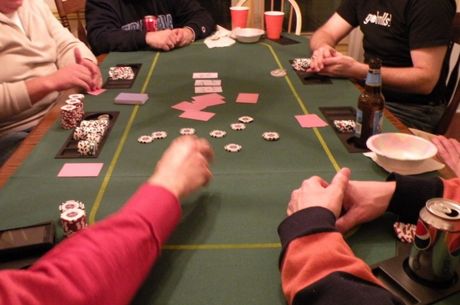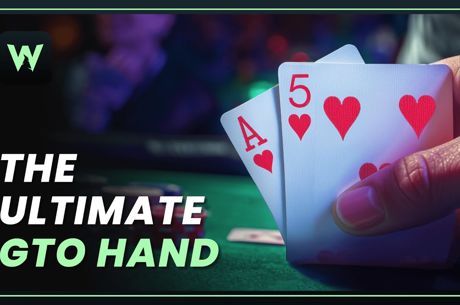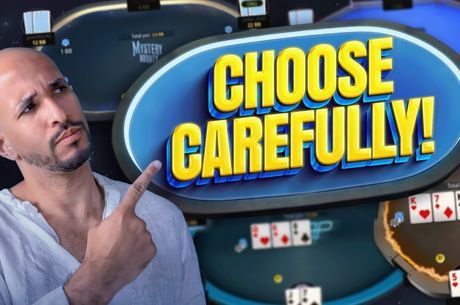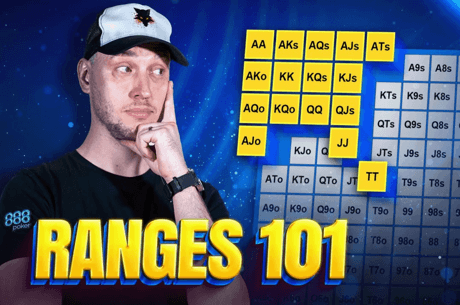Five Mistakes Made by Intermediate Poker Players (and What to Do About Them)

In poker, there is a big difference between a clueless beginner and an intermediate player.
While beginners fumble with their chips and often take a long time deciding what to do at the poker table, intermediate players are able instantly to abandon their bad starting hands, while easily flicking in their raises crisply and confidently. It doesn't take long at all for players to gain some basic knowledge to distinguish them from the absolute novice.
Yes, being an intermediate player in poker can feel satisfying when you compare yourself to the newbies. But there are many common mistakes that might be holding intermediate players back from realizing their full potential to make money at the game.
Following up on yesterday's article "Five Common Mistakes Made by No-Limit Hold'em Beginners," let's take a look at the five worst mistakes intermediate players tend to make while also considering ways such players can overcome them.
1. Overvaluing their abilities
The American Automobile Association did a survey a while back. They found that just about 90% of all drivers considered themselves to be above average in driving ability. Of course, that can't be statistically valid. Even so, the same overestimating tendency is often demonstrated by poker players.
Since the vagaries of chance swing so widely, even a really bad losing player might convince himself that his losses are the result of bad luck rather than bad play. This creates a problem of arrogance.
The difference between a new and an intermediate player is so pronounced and so obvious, the intermediate player often thinks that since he is no longer a beginner he is better than he actually is. By learning some basic concepts and getting comfortable with the trappings of the game, he can often speak the language of poker, thereby making him able to fit in to the poker world. But this level of comfort is in fact deceptive. Since he can converse in a way that makes him appear to a non-poker player to be an expert, he mistakenly can be seduced into thinking he is an expert. He is not.
Such a belief stops the learning process prematurely as the intermediate player thinks he doesn't really need to learn. He tends to become complacent and even condescending about poker literature. I've heard many a poker player brag about how he has never read a poker book or watched a training video.
The cure for this problem is simple — humility. The best players get that way by never stopping their learning. So, too, must an intermediate player continue to learn.
2. Acting poorly toward the lesser-skilled
The second mistake that non-beginners often make is in how they act toward other players. Many intermediate players, having egos that are not supported by a successful playing history, incorrectly blame others for their losses. Their behavior and their words at the poker table often reflect this tendency.
They berate opponents for poor play that they incorrectly identify as the cause of their loss. In so doing, they sometimes drive away bad players they might actually beat. By not being welcoming and polite, they chase away the "fish," or they make them pay attention when they would be otherwise inattentive.
The solution to this is simple, even if it isn't easy at first. Adopt a pleasant, friendly, and welcoming demeanor at the table. Resist the urge to show off your poker knowledge, proud though you may be of your achievement. Remember that you're really not that good yourself yet, and that your profit will come from the mistakes of players who are worse than you. Don't frighten them away or smarten them up.
3. Playing too tightly preflop
Getting into other types of mistakes having to do with actual game play, one common mistake among intermediate no-limit hold'em players is to play too tightly preflop. Whereas some brand new players will be too loose with their starting hand requirements, the non-beginners will often play too few hands. This is understandable, to be sure — but it is still a major flaw.
One of the first things that a beginner can learn quickly is the need to be selective. While this can help new players save money while they learn — and while it can keep them out of some trouble by helping them avoid hands that can cause problems — when applied too mechanically and severely, such an approach can greatly restrict potential profits.
The intermediate player may not be properly valuing the implied odds that exist in no-limit poker. Or, lacking experience, he may not have the temerity to mix it up when he holds anything but a truly superior starting hand. Similarly, he may have tried to become a winning player by memorizing a simple and short list of playable starting hands, and subsequently won't want to deviate from it.
This over-tightness will cut into his potential profit in two ways. First of all, he'll be missing opportunities to profit from hands that might well improve to winning hands as the hand progresses, opportunities of which his opponents will be taking advantage. Second, his super-tight style will train even his unobservant opponents to avoid him at all costs, severely hurting his ability to make money when he does hit a monster hand.
4. Staying too long in a hand
Another intermediate mistake is staying too long with a good starting hand, even after the action of others should convince you to fold. Players who learn simple lessons simply and then apply them robotically tend to get themselves in trouble by not having the flexibility to get away from hands that start out superior, but go south against other hands. They invest too much in high quality starting hands, and then can't find folds with them.
Here's an example.
Imagine an intermediate player in a $1/$2 game who starts with Q♥Q♠ in early position — one of the very few starting hands he'll play in this spot. He opens with a raise to $10. His opponents being relatively loose and passive, he gets two people to call him.
The flop comes A♦9♦2♣, and being first to act he bets $25. The next player raises him to $60. The last player takes some time thinking, looks at the pot for a while, then calls. The intermediate player then also calls, figuring the raiser might be bluffing and the next player is probably on a flush draw.
In this hand the intermediate player saw a rare premium pair, bet it aggressively preflop, but then couldn't get away from it, even when the objective information should have convinced him to fold. Intermediate players, playing as tightly as some often do, often fall in love with the few hands they do play. This is perhaps the greatest and most easily exploited mistake in the way they play.
Intermediate players sometimes do not properly respect the bets of others. Also, since they overvalue their own play they tend to mistakenly downgrade the abilities of others. Accordingly, they too readily call large bets from opponents they see as inferior, not being willing to give their opponents credit for the hand that they are representing.
The antidote to this and the previous mistake is to loosen up preflop and then to develop the discipline to throw away good starting hands that seem to fall behind on the flop. This takes experience and judgment — something that intermediate players often lack.
5. Overvaluing the importance of winning during any particular session
Excellent players understand that it is all one big game. They know that if game conditions are favorable, it's critically important for them to make as much money as possible for as long as they are able to play profitably. Similarly, they are able to recognize when game conditions are not favorable, and they know how to limit their time in those games.
But an intermediate player often makes the mistake of caring too much about whether he is up or down for a particular session. His ego is not yet confident enough to withstand the rollercoaster ride that is poker. So he cuts off winning sessions too soon, locking in a win in his mind. He also makes bad situations worse by chasing his losses until they have become huge.
He does not yet have the skill to truly size up a game — not based on how he is doing but based on the skill of his opponents. This can be a bankroll crushing error.
Conclusion
The intermediate player will forever stay at his level, which is almost surely losing to the rake if not to the other players, if he doesn't develop the humility to recognize that he still has a lot to learn about poker. He then must learn enough about the game to move beyond the simple and mechanical style of play that he first mastered when he moved up from beginner.
In so doing, he will need to outplay opponents, putting himself into more hands where he can use and develop his skill. And finally, he will need to stay or leave games not based on whether he is ahead or behind but based on his honest assessment of whether the game conditions are profitable.
Ashley Adams has been playing poker for 50 years and writing about it since 2000. He is the author of hundreds of articles and two books, Winning 7-Card Stud (Kensington 2003) and Winning No-Limit Hold'em (Lighthouse 2012). He is also the host of poker radio show House of Cards. See for broadcast times, stations, and podcasts.









